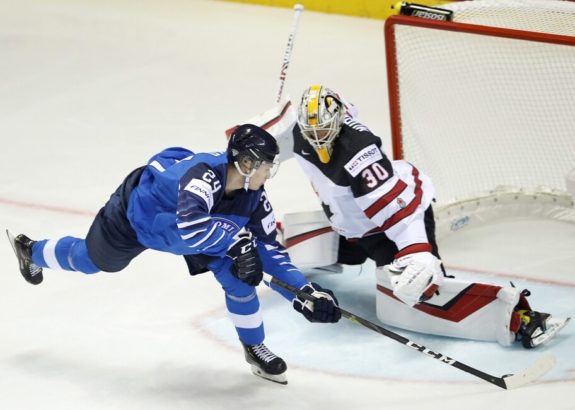We should stop being surprised at Team Finland’s successes at the IIHF World Junior Championship. Firstly, they’ve been producing more elite talent now than they’ve perhaps ever had, even with legends such as Teemu Selanne and Jari Kurri. As one of the smallest countries to participate in the tournament, Finland has always seemed to play a certain underdog role, even as defending champions.

Finland’s start to the tournament certainly showed that they may have difficulty following up their gold medal victory of 2019. They played well but lost to arch-rival Sweden in the first game of the tournament in overtime. They dominated against Slovakia and Kazakhstan but then lost against Switzerland in what we could consider an upset.
In particular, the game against Switzerland was interesting in the fact that you can say Switzerland beat Finland at its own game. Playing a similar game as Finland is something the Swiss had to do for years to remain competitive in international competition.
It involved constant skating, hard forechecking, neutralizing entries, good defensive coverage and excellent goaltending. Whatever Finland threw at them, the Swiss responded well, as evidenced by a very strong second period that took the game away.
Finland ended the preliminary rounds third in its group and fifth among all teams. Everyone certainly expected more of them and they would have to return to what made them successful for a chance to defend their championship.
Getting Back to Work
But its biggest test came on Wednesday as its elimination rounds began with a quarterfinal game against Team USA. The Americans weren’t performing too badly, but they were still below expectations considering the goal-scoring talent they have. So coming into this game, the Finnish team would have to depend less on its talent and more on its structure and discipline to win.
That’s exactly what they were able to do. Finland completely shut down the Americans, barely allowing any space to get good scoring chances in high-danger areas. Some of the best chances that Finland surrendered in tight were backhand shots because the American player barely had any space to go around a Finnish defender.
Finland made American zone entries completely tedious as they clogged up every part of the middle of the ice. It gets even more difficult to score without any momentum and Finland didn’t give any to the United States. Finland frustrated the Americans so much that some of their most prolific offensive players saw reduced ice time in an effort to get ahead in the game.
Of course, goaltending also played a big part in the outcome of the game, as it did in the game against Switzerland. This time, Finland’s goaltender Justus Annunen got the better of his opponent, and he seems to step up his game more the tougher his competition his.
A Finnish Patience
When Finland goes up against Canada in the semifinals on Saturday, you can bet they’ll put even more emphasis on the same game plan they used against the United States in the quarterfinals. Canada has seemingly found its game after its embarrassing loss to the Russians in the preliminaries; the Canadians are a different and more complete team than they were when they began the tournament.
That’s why Finland hopes that it can keep the game to an exciting yet low-activity event. The team will demonstrate that they can figuratively wait all day for anything to happen. They will use their skill to generate offence but not at the risk of allowing an odd-man rush against them.
Finland will essentially aim to put Canada to sleep in order to find an opening to score. Particularly on the power play in which they rank third in the tournament with a 30% success rate, Finland can wait for their opponent to not only make errors with the puck but without as well as they draw penalties. Canada’s top-ranked power play will have its work cut out, as Finland is second on the penalty kill.
So in every defensive aspect, Finland has met expectations. The Finns will hope that the momentum from a game played to near perfection against a strong team like the United States will carry over and remain for the rest of the tournament.